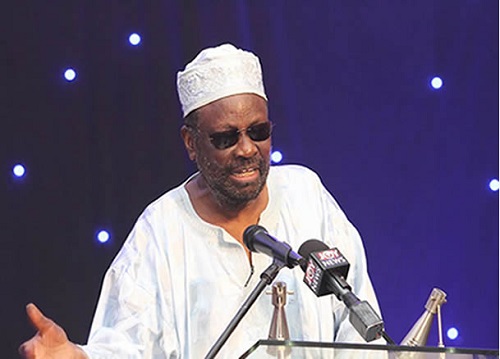A picture that dominated the bed-sitting room of Akwasi’s teacher, greeted him each morning.
As the “class prefect”, it was automatically his job to sweep the teacher’s room, straighten the cushions in the arm-chair, and wipe the dust off the table.
Teachers weren’t paid much, and the room was quite austere. So cleaning it was soon finished and Akwasi would run home to get himself ready for school.
The drawing itself did not attract much notice from Akwasi. Was it of a boy and his father wielding hoes and tilling the soil? He couldn’t be certain.
But the title of the picture was unforgettable. It was written in the teacher’s beautiful cursive script. Where did he acquire such a majestic calligraphy? Akwasi wished…!
That title was simple.
It was eloquent.
“This must have been how intelligent students felt, on first reading Einstein’s E = MC2,” he deduced much later in life, when he’d begun to understand physics.
The caption said: “Ɔba sɛ ɔse na nso ɔwɔ abusua!”
(Meaning: “The child takes after its father,
But it belongs to a family!”)
How did the teacher come by this “equation-in-words” that did for Akan sociology, what Einstein’s algebraic equation had done for physics?
Akwasi was too shy to ask the teacher about the picture. For as the class prefect, he was supposed to observe things and not talk about them. He had to keep absolutely confidential, anything he saw in the teacher’s room. For gossip would subject the teacher to evaluation by the pupils in his charge and reduce the potency of his power over their minds.
Why did the saying come to Akwasi’s mind when he was told that it was somebody in his own abusua (“extended family”) who had taken Chinese gold-diggers to the farm left by Akwasi’s late father, to dig for gold there? The galamseyers had cruelly used excavators and bulldozers on the farm and totally wrecked it permanently. Anyone who knew the farm as it was in times past, would weep if he saw it now.
Was this the same farm on which plantains, cocoyams, cassavas, bananas and other food plants had grown luxuriantly? Mushrooms; palm trees; grass-cutter traps; birds…
Akwasi knew he wouldn’t ever be told who the culprit was. All he knew from the whispers he had heard was that both he and the guy came from “the same family”. Someone had hinted that the guy was called “Paul”. Paul what? End of trail.
Not that it would have been strange if the guy had never had a surname. Or if he had one and never used it. For in Akan society, a woman is not obliged to disclose who the man was, with whom she’d had a child. Due to the ancient appreciation of large families, whose members could coalesce – in strength – to defend themselves in the event of an attack against their clan, families accepted each child as a blessing. If it had a known “father”, all well and good. But if it didn’t, that didn’t matter too much. The abusua would help the woman during her period of confinement, and help her to bring it up.
How do you know it was Paul who brought the gold-diggers? Akwasi asked members of the family to which both he and Paul both belonged.
Everyone pretended not to know. For the corollary of the statement “ɔwɔ abusua” [he has a family] was that the family would protect its secrets, even from its own members who were inclined to “branch out” and cause harm to the aberrant amongst the group. The bonds that bind Akan families together are like those of the Italian mafia, only much stronger, for whereas the Italian Mafiosi may be recruited from the wider Italian gangster society, members of Akan families can never be recruited.
Moreover, they cannot be expelled! Nor can they resign. In the past, clan elders could discipline them, by calling them to account for disreputable acts, especially, those that had the propensity for “shaming” the entire family. But nowadays, with so much travelling in and out of people’s birth-places, family members could only really identify one another, and thereby be influenced by the “elders” amongst them, if the will to do so was strong. And where would this “strength” come from, when members of families now saw so little of one another, as urbanisation caused fragmentation in society?
In fact, funerals are, nowadays, the only occasions during which a majority of the members of a ‘family’ might get together. And since they don’t see much of one another, in any case, superficial activities, – particularly boozing together – may be the only means of getting together.
At such artificial social gatherings, of course, it is not polite or appropriate to raise serious issues. Any person who might want to use such an occasion to “pry” into the lifestyles of “family members” he did not see that often, or hardly knew, would be fought – not only by their mother and other close associates, but by members of the larger family.
A few cedis expended by the “suspect” and a protective group would amorphously form around him to take up the cudgels on his behalf. He just had to be rich. For the rich never come under a successful attack.
Indeed, no-one ever questions the “source” of money now, in our society.
That’s why it’s been possible for our rivers and water-bodies and farms to be destroyed under our very noses.
“Yɛn ara y’abusufoɔ n’ɛyɛɛe! Enti, ɛmmfa yɛ ho!” [It was done by members of our very own families. So we are not concerned.]
Q.E.D.
By Cameron Duodu


